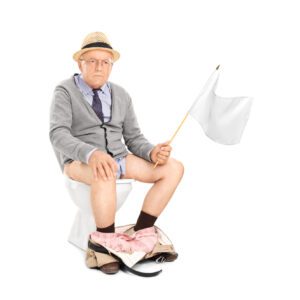Go Easy: Updates on Constipation Advice

Go Easy: Updates on Constipation Advice
May 31, 2023
It’s a perennial problem that seems to only get worse with aging. Constipation is considered the most frequent gastrointestinal complaint, and while older adults are not the only ones who suffer, they are afflicted with more frequency. About 16% of adults have chronic constipation, but for adults aged 60 and older, that number jumps to 33% and for those who live in long-term care facilities, it’s thought that almost 50% suffer. How is constipation defined? You are considered constipated if you have a bowel movement less than 3 times per week, though everyone is different. Why is it that problems with constipation increase with age? For anyone of any age, changes in your diet, health, medications, or routine can upset your bowel habits. But as you get older there can be other aggravating factors, including becoming dehydrated more easily, moving less (an important influence on moving your bowels), colon thickening, hemorrhoids that may interfere with bowel evacuation, or other aging-related maladies. And of course, once you develop constipation, the stress of not going just heightens the distress and discomfort, along with the pressure you experience when you know you need to go.
Short of using an over-the-counter laxative or seeing your physician, what are some strategies for emptying your system? Recommendations for “natural” (i.e. non-medicinal) laxatives abound, but common among the suggestions are the following: Make sure you drink plenty of water each day (we know that among some older adults, thirst sensation often diminishes so don’t wait until you’re thirsty), stay physically active and regularly exercise, make sure your fiber intake is sufficient (25-30 grams in your daily diet) along with eating a healthy diet (some advise plenty of prunes and kiwi on your fruit plate). Another suggestion is adding fresh or canned pumpkin to help.
And set aside the time and focus to create a comfortable schedule that works for you. For example, your GI system apparently also goes “to sleep” at night but for most of us is ready to roll first thing in the morning. So creating a routine to allow your bowels to wake up and evacuate is important. In fact, if you feel the need to go but instead delay, your body is likely to reabsorb water and make the stool harder and more difficult to pass. So go when you need to go. Interestingly, your posture is also important. You may have heard of a “squatty potty,” which is a stool on which to rest your feet that ensures your knees are above your waist when you need to go. This posture allows for more natural bowel evacuation and less straining. For an aesthetically pleasing potty stool, have a seat and look here.
What about laxatives? As we’ve previously said, over-the-counter laxatives can be a useful way to get you over a constipation crisis. If improving your diet and expanding your level of physical activity don’t do the job, an over-the-counter laxative is another alternative. There has been some concern over a new study out of the UK reporting an association between laxative use and a significant uptick in certain types of dementia, though more research needs to be done to confirm these results and determine the reasons. The study involved participants in the UK where laxative use is high and abuse of laxatives may be common. While there was no increase associated with Alzheimer’s, there was a significant increase in vascular and all-cause dementia among laxative users, especially those who used more than one type of laxative. For more on this study, read here.
There are several types of over-the-counter laxatives currently on the market, each involving a different mechanism to ease bowel movements. There is always the risk of side effects with a laxative, including excess gas, cramping, bloating, or dehydration. It’s advised that you speak with your physician before starting a laxative, especially if you already take other medications. Finally, earlier this year another option came to market to help relieve constipation: it’s called Vibrant, and it’s a pill that causes micro-vibrations in your bowel to help ease evacuation. Intended for people with chronic constipation, this new pill may be just the product you need to get things moving again. For more information, click here.







